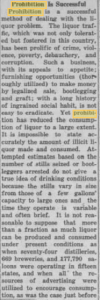
A snippet of the article which touts alcohol prohibition as a highly successful way of purifying Ameican culture.
The prohibition of alcohol in the United States highlights the historic connection between church and state in American government. American white Christian denominations had enough sway on governmental legislation to outlaw a significant player in the birth of their own nation. Prohibition began as a way to curb the activities alcohol promotes (which are, in general, condemned by the Christian church) but ended in part due to the Great Depression and the loss of a significant portion of Federal income in the form of sales taxes. (Bordeaux, 2007) Largely, prohibition was either a success or a failure depending on whom you asked.
It is critical to understand this newspaper article within the context of the geo-socio-political climate of North Carolina in 1932. North Carolina is known in modernity as a member of the Bible Belt, a term for the highly Christian American South, due to its history of social and political Christian supremacy. It is impossible to discuss early twentieth century American Christian identity without recognizing the role the Ku Klux Klan played in the Southern theater, a fact highlighted in the discussion of the Prohibition. Kat Eschner of the Smithsonian Museum System states in her article Why the Ku Klux Klan Flourished Under Prohibition “The American government created an entire Prohibition Bureau intended to enforce alcohol-free living. However, this bureau selectively targeted groups that were perceived as inherently corrupt, like poor people, immigrants, and African Americans.” (Eschner, 2017) Understanding the higher ideological support the KKK had in the American South at the time this article was written provides context into the potential motives and bias that sparked the writing of this article.
Understanding that the prohibition of alcohol was largely spearheaded by white American Christians, it is no surprise that The Daily Tar Heel reports prohibition as successful. “Prohibition is a successful method of dealing with the liquor problem. The liquor traffic, which was not only tolerated but fostered in this country, has been prolific of crime, violence, poverty, debauchery, and corruption.” (F. Scott McBride, 1932) The University of North Carolina at Chapel Hill has a long history of being funded and operated by Southern white men, which becomes problematic when analyzed from the lens of Southern racist history. This claim is evidenced by the currently ongoing struggle for justice regarding Silent Sam – the statue honoring fallen Confederate soldiers.
In conclusion, this article presents an intriguing peek into the opinion of the University on alcohol prohibition, but also serves as an exercise in appraisal of public media. In order to fully understand the motivations behind the article, one must consider the political context of North Carolina and the greater American South at the time.
Honor Code: Erik Feldmann
Works Cited
Bordeaux, Don. “The Politics of Prohibition.” Reason.com, Reason, 31 July 2007, reason.com/archives/2007/07/31/the-politics-of-prohibition.
Eschner, Kat. “Why the Ku Klux Klan Flourished Under Prohibition.” Smithsonian.com, Smithsonian Institution, 5 Dec. 2017, www.smithsonianmag.com/smart-news/why-racism-flourished-under-prohibition-180967406/.
McBride, F. Scott. “Prohibition Is Constitutional And Logical Remedy For Liquor Evils.” The Daily Tar Heel, 26 Jan. 1932, universityofnorthcarolinaatchapelhill.newspapers.com/image/67938672.